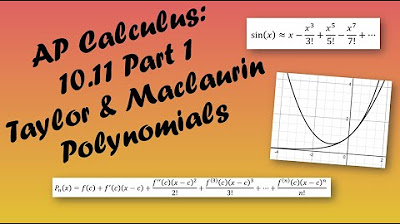Polynomial approximation of functions (part 2)
TLDRThe video script discusses the concept of approximating functions with polynomials, specifically focusing on the Maclaurin Series as a method for achieving this. The explanation begins with basic approximations, such as using a constant, and progresses to more complex approximations involving derivatives and factorials. The key idea is that by taking the derivatives of a function and evaluating them at a point, these can be used to build a polynomial that approximates the original function. The script culminates with the revelation that the Maclaurin Series, when applied to the exponential function e^x, results in a polynomial where all coefficients are 1, highlighting the elegance and power of mathematical concepts.
Takeaways
- 📈 The video discusses the concept of approximating a function with a polynomial.
- 🔄 The approximation starts with a constant polynomial and iteratively improves by matching derivatives at x=0.
- 🧠 The process involves adding terms to the polynomial to match not only the function's value and slope at x=0 but also higher order derivatives.
- 📚 The general term in the polynomial is constructed using the nth derivative of the function at x=0, multiplied by x to the power of n and divided by n factorial.
- 🌐 This method of approximation is part of a broader mathematical concept known as the Maclaurin Series, which is a specific case of the Taylor Series and a type of power series.
- 🤔 The video hints at the profound and beautiful nature of mathematics, particularly when dealing with concepts like the Maclaurin Series.
- 🎯 The Maclaurin Series is shown to be a powerful tool for approximating functions, especially when the approximation is carried to infinity.
- 🌟 The function f(x) = e^x is highlighted as an amazing function, with all its derivatives equaling e^x, making it particularly interesting for the Maclaurin Series.
- 📌 The video emphasizes the importance of understanding factorial in the construction of the series, as it relates to the decrementing of the exponent and multiplication of the expression during differentiation.
- 🔢 The Maclaurin Series for e^x is shown to be a sum of terms with the pattern (e^0)/(n!) * x^n, where n starts from 0 and goes to infinity.
- 💡 The video ends with a teaser for the next lesson, promising to delve deeper into the Maclaurin Series for the exponential function.
Q & A
What is the main concept discussed in the video script?
-The main concept discussed in the video script is the process of approximating a function with a polynomial, specifically focusing on the Maclaurin Series as a method for achieving this approximation.
What is the initial approach to approximating the function f(x) with a polynomial?
-The initial approach is to approximate the function f(x) by making the polynomial a constant that intersects f(0) at x = 0, which is considered a 0th order approximation.
How does the approximation improve when considering the slope at x equals 0?
-The approximation improves by ensuring that not only do the polynomial and the function intersect at x = 0, but also their slopes are the same at that point, which is a 1st order approximation.
What is the significance of the second derivative in the approximation process?
-The significance of the second derivative is that by matching the second derivative at x equals 0, the approximation becomes more accurate, especially near the point of intersection.
How does the factorial function relate to the derivatives in the Maclaurin Series?
-The factorial function is used in the denominator of each term in the Maclaurin Series to account for the number of times the derivative is taken. It is used to ensure that the correct multiples of the exponent are applied during each step of the approximation process.
What is the definition of a factorial as used in the script?
-A factorial of a non-negative integer n, denoted by n!, is the product of all positive integers less than or equal to n. For example, 4! = 4 × 3 × 2 × 1 = 24. The factorial of 0 is defined as 1.
What is the general formula for the Maclaurin Series of a function f(x)?
-The general formula for the Maclaurin Series of a function f(x) is given by p(x) = Σ [f^n(0) * x^n / n!] from n=0 to infinity, where f^n(0) represents the nth derivative of f evaluated at 0.
Why is the function e^x considered special in the context of the Maclaurin Series?
-The function e^x is considered special because all of its derivatives are equal to itself. This means that when approximating e^x with a Maclaurin Series, the series will converge to e^x exactly, not just approximate it.
What is the value of the first derivative of e^x?
-The value of the first derivative of e^x is e^x. This is a unique property of the exponential function, as its derivative is the same as the function itself.
How does the Maclaurin Series relate to the Taylor Series?
-The Maclaurin Series is a specific case of the Taylor Series where the expansion is centered at 0. The Taylor Series is a more general concept that allows for expansion around any point.
What is the significance of the Maclaurin Series in mathematics?
-The Maclaurin Series is significant in mathematics as it provides a powerful tool for approximating functions with polynomials, which can be particularly useful in various fields such as engineering, physics, and computer science.
Outlines
📚 Introduction to Polynomial Approximation and Derivatives
This paragraph introduces the concept of approximating a function with a polynomial. It begins with the simplest case of a zero-order approximation, where the polynomial is a constant intersecting the function at x=0. The discussion then progresses to first and second-order approximations, where the slope and second derivative of the polynomial match those of the function at x=0. The explanation leads to the idea of adding more terms to the polynomial to match higher-order derivatives, emphasizing the role of factorials in the denominator of each term.
🌟 Exploring the Maclaurin Series and the Function e^x
The second paragraph delves into the concept of the Maclaurin Series, a specific case of the Taylor Series, which is a power series used to approximate functions. The explanation focuses on the process of creating a polynomial approximation by summing the derivatives of a function evaluated at zero, each term multiplied by the corresponding power of x and divided by the factorial of the derivative's order. The paragraph culminates with the application of this process to the exponential function e^x, highlighting the unique property that all its derivatives are equal to itself.
Mindmap
Keywords
💡Polynomial Approximation
💡Derivative
💡Maclaurin Series
💡Factorial
💡e to the x (e^x)
💡Infinite Series
💡Taylor Series
💡Power Series
💡Sigma Notation
💡Rate of Change
💡Combinatorics
Highlights
The process of approximating a function using a polynomial is discussed, starting with a constant polynomial and progressively improving the approximation by matching derivatives at x=0.
The concept of a zeroth order approximation is introduced, which involves setting the polynomial to intersect the function at x=0.
The idea of matching the slope of the function and the polynomial at x=0 is explored, leading to a better approximation using a linear polynomial.
The approximation is further refined by ensuring that the second derivative of the polynomial matches that of the function at x=0, leading to the addition of a new term in the polynomial.
The concept of factorial is explained, which is crucial for understanding the denominators in the polynomial's terms when matching higher-order derivatives.
The definition of factorial is provided, with examples given to illustrate how it works and its significance in combinatorics.
The video introduces the idea of taking the nth derivative and how it relates to the factorial in the context of the polynomial approximation.
The Maclaurin Series is defined as the infinite sum of the derivatives of a function evaluated at 0, multiplied by x to the power of n and divided by n factorial.
The Maclaurin Series is presented as a powerful tool for approximating functions, with the potential to lead to profound mathematical insights.
The concept of Taylor Series is briefly mentioned as a broader context for the Maclaurin Series, indicating that the Maclaurin Series is a specific example of a power series.
The function f(x) = e^x is chosen for demonstration, highlighting its unique property where all derivatives are equal to the function itself.
The significance of the function e^x is emphasized, suggesting a deep connection between its mathematical properties and the mysticism of its behavior.
The process of approximating e^x using the Maclaurin Series is outlined, providing a concrete example of how to apply the theoretical concepts discussed.
The video concludes with a teaser for the next installment, promising to delve deeper into the powers of the Maclaurin Series and its applications.
Transcripts
5.0 / 5 (0 votes)
Thanks for rating:





